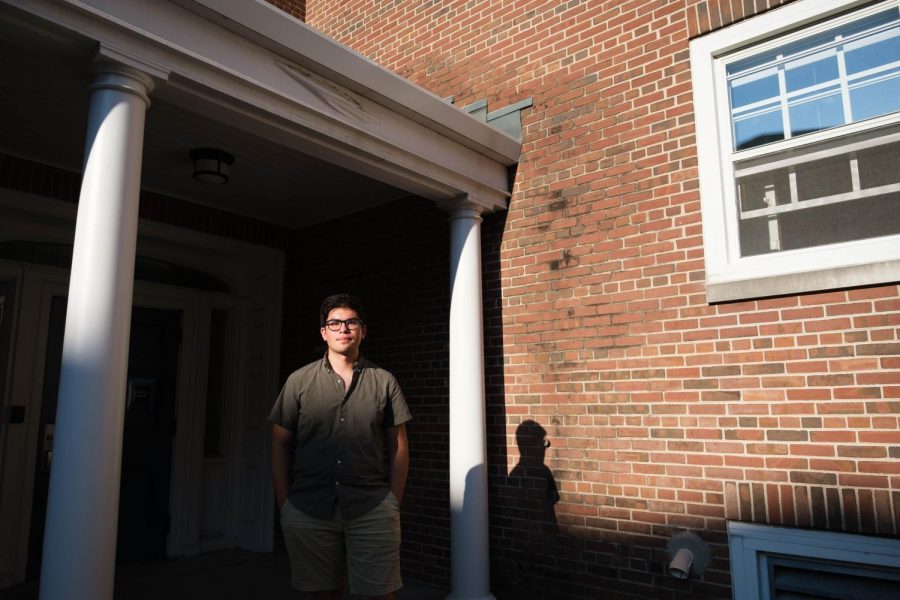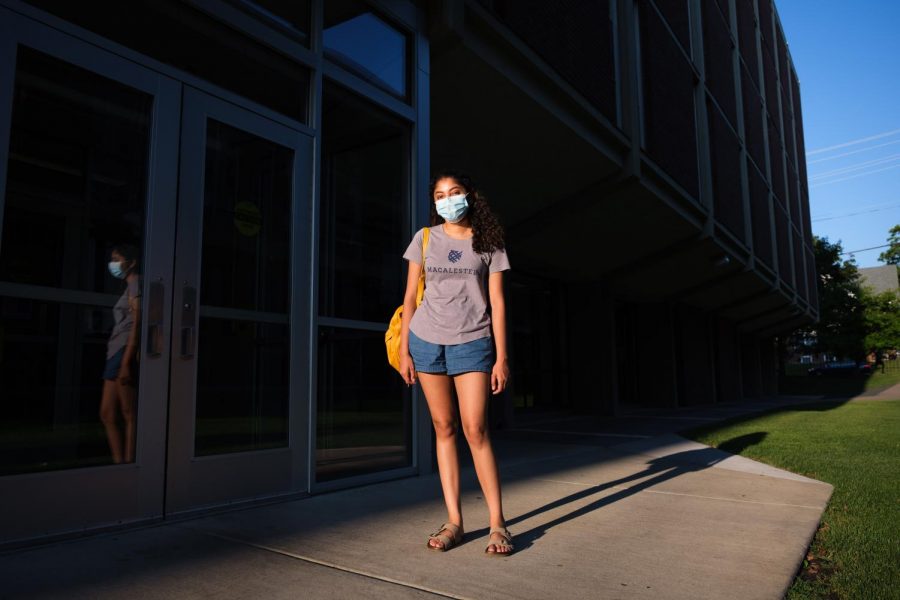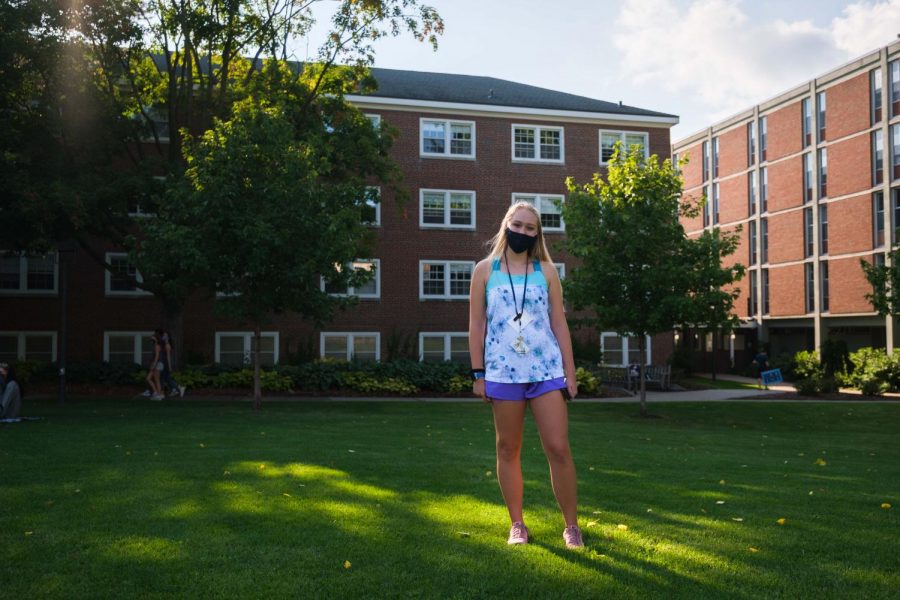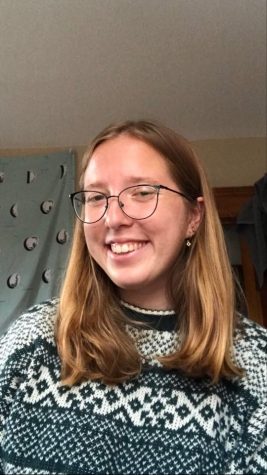2024: First-years arrive at Mac, reflect on unusual start to fall semester
August 28, 2020
When this year’s residential first years arrived to campus on Aug. 26 and 27, they met a situation that would have been unthinkable only months ago. Newcomers and their families filtered in at staggered arrival times, filing one-by-one through registration tents, submitting samples for COVID testing and unpacking suitcases into almost exclusively single-resident dorm rooms.
These students, the 465 first-years who ultimately decided to start their Macalester experience in person, will make up the vast majority of students living on campus this fall, at least during module one.
On Aug. 10, with COVID cases on the rise in Minnesota and across the country, the college upended its original plan to bring the majority of its students back to the Twin Cities and turned to a policy where only first-years, international students with housing contracts, and upperclassmen with extenuating circumstances would be allowed to return to campus.
They will, for the most part, live without roommates and be asked to minimize all social interactions for a two-week “quiet period” at the start of the semester. The college advised them to pack light, avoid travel for the first semester and be prepared for plans to change further.

“That kind of scared me,” Tyler Sanchez ’24 said. “Everything had been pretty calm before that point, and then I got an awakening. Even though it’s a safer situation than it would have been prior — I was just like, ‘Oh, this is real.’”
Sanchez briefly considered not coming to campus at all, staying in his hometown in the suburbs of Chicago. But ultimately, the desire to come to Minnesota and start this next chapter in his life won out.
For the most part, he and many of his peers are optimistic. They see Macalester as much more prepared than other colleges — some of which saw large COVID outbreaks just days or weeks into the semester.
“My friends’ colleges… they were in worse situations,” Sanchez said. “[At Macalester] there’s only 500, 600 people on campus, we have some testing. That makes me feel better than going to a campus that there’s absolutely no testing, there’s like 10,000 kids at big state schools. Putting it in comparison, I feel like my situation is a little bit better.”
As of now, Sanchez has heard widespread commitment to the COVID regulations from his fellow first-year students, although he did say it’s difficult to tell who will keep to their promises.
Over the summer, Sanchez has connected with a number of other incoming students on social media and already begun to bond with the people he will share Macalester’s campus with. While connecting with other first-years online is by no means a phenomenon unique to this year, those bonds have taken on new importance.
“You have to be more innovative with the way you’re going to meet people,” Sanchez said. “I have to be innovative on how to make friends, which is already hard to do.”
Students are already trying to figure out how to bond from a physical distance. For example, Sanchez was thinking about buying a projector so that he and his friends could watch movies on one of the quads.

All of that said, there’s still uncertainty. Will first-years be able to resist the urge to gather, and limit their social circles? It’s a question on Sanchez’s mind, especially now that he knows there won’t be older students around.
“There’s a comfort of being around seniors and juniors and sophomores that are more mature,” Sanchez said.
While there won’t be an on-campus upperclassmen influence, another first-year, Kamini Ramakrishna ’24, sees that as a benefit. Especially since without access to older students’ houses, there will be fewer opportunities for first-years to socialize in large groups or party off-campus.
“Since Mac isn’t really a party school, since we don’t have the upperclassmen there with us, I don’t really see partying as being a big issue,” Ramakrishna said.
But she’s tempering her expectations, at least until the first two weeks have passed and the second round of testing reveals the efficacy of Macalester’s preventative measures.
“I do want to stay optimistic, and I always hope things will go smoothly,” Ramakrishna said. “I don’t want to have that in my mind that we’ll be sent home soon — I don’t want to accidentally manifest that by thinking about that too hard.”
Across the country in Massachusetts, Hannah O’Conner ’24 has already made that call for herself. After the August 10 updates to the college’s reopening plan, O’Conner decided to stay at home until the situation stabilized.
“In an ideal world, I would love to be going, and I want to be going — that’s not a question, I’m ready for this next chapter,” she said. “So in some ways, it feels kind of like prolonging the inevitable. Although in other ways, it’s just what’s smarter.”
O’Conner has been watching COVID cases spike around the country, and those statistics, when combined with her concern for the safety of several high-risk family members, led her to a decision she never thought she was going to have to make.
It’s been a particularly difficult year for the class of 2024. Many of them saw the end of high school cut short; their proms, senior trips and even graduations canceled.
“I had kind of been seeing college as a distant ship on the horizon,” O’Conner said. “It just felt like we were sludging through mud this entire year, and it didn’t really feel realistic to start thinking about school and getting my hopes up. But I quietly held onto them.
“I was honestly, fully expecting at least in an in-person capacity to begin school,” she continued. “And then things have escalated, the numbers are not trending in a positive way… It sucks, honestly.”
Luckily, things aren’t all bad. O’Conner has connected with a number of other incoming first-years online, chatting with a handful of people on the phone and texting a bunch of first-years in a big group chat
Remaining at home also means that O’Conner won’t face the ultimate uncertainty many of her peers are confronting: if something goes wrong, they could all be sent home.
“It feels odd to be packing your bags to go to college knowing that they can send you back a week later,” Arista Siebrits ’24 said. “I would be devastated if that would happen.”
Siebrits is coming to Macalester under singular circumstances. Growing up in South Africa, she’s been attending a U.S. school online since eighth grade. And while students nationwide prepare for their first full semester of remote education, Siebrits is doing the opposite.
“I think your freshman year of college is perhaps the most intriguing, wonderful, new start to a new life ever,” she said. “You’ll very rarely find something that tops that excitement in your life… That is such a landmark moment.”
And Siebrits is entering the year with a lot of optimism. She feels strongly that the college has the first years’ “best interests at heart.”
“We feel safer going into this community than, I think, another student from another school would because we know we chose a school that chooses students who care deeply about their peers and their community — building a safer environment for everybody,” Siebrits said.
“If there’s one thing that gives Macalester a chance to keep on-campus classes this year more than any other school in the country, it’s the fact that everybody on this campus that I met so far, really has this drive to look after each other and work together to keep things running.”
Additional thanks to Rose Giblin-Vance ’24, who was also interviewed for this story.















Bob Spaulding '65 • Sep 9, 2020 at 7:15 pm
Yo Nick. Of course the aftereffects of COVID-19 can be serious–but this too is highly correlated with age. Younger people are not only less likely to get it but also far less likely to suffer any aftereffects. The seasonal flu is more likely to kill those under twenty than COVID-19. Many young people have gotten it and been totally asymptomatic.
Lester, thanks for making my point about the age distribution of COVID-19 sufferers. Then I guess you agree with me that the elderly should take more precautions than the young. Ergo, Macalester should be fully open for business, albeit with reasonable social distancing.
And I get along fine with my children. And grandchildren.
LESTER • Sep 4, 2020 at 4:08 pm
Hey Bob, what’s the COVID death risk for a man in his late 70s?
LESTER • Sep 4, 2020 at 4:04 pm
Bob, do you just hang out in these comments thread because your children won’t talk to you anymore?
Nick Velikonja • Sep 4, 2020 at 1:42 pm
Yo Bob, quick fact check here: a) getting sick from coronavirus (even if you don’t die) is quite unpleasant and can leave lasting health effects, b) Macalester students have contact with a number of more vulnerable people like professors and staff. For them it actually could be deadly. c) campuses have already proved to be great Petri dishes for virus spread. So you’re very likely to get cases, spread the virus to vulnerable people, and cause needless pain.
Bob Spaulding • Sep 1, 2020 at 9:17 am
Macalester students in this academic year will receive a vastly inferior education because of Macalester’s overreaction to the COVID-19 pandemic. Fake news and “safetyism” have conned Americans into faulty policies that do more harm than good.
For starters, what are the odds of dying from COVID-19 in a given year? We know that the deaths are highly correlated with age and comorbidities. Of the 1,730,000 American deaths so far from this disease, guess how many were 20 years old and under? One in 100? One in 1,000? Nope. 120, which is one in 14,416. Since age 20 is about the average age of Macalester students (who is probably healthier than the average 20 year old), the expensive and educationally destructive measures Macalester is undertaking do not pass a cost/benefit test.